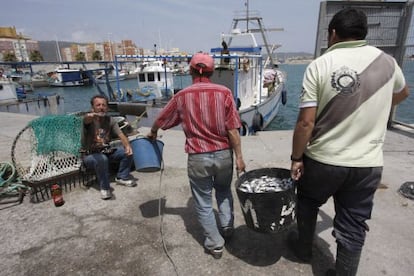Spanish fishermen to get Civil Guard escort into disputed Rock waters
Gibraltar stands firm in decision to prevent fleet from entering flashpoint zone

The government has banged the table in the face of the breakdown of negotiations between Spanish fishing fleets based at Algeciras and La Línea de la Concepción in Cádiz and the Gibraltar authorities over the sovereignty of the waters surrounding The Rock.
On Wednesday, Spanish police began carrying out checks at the disputed 800-meter isthmus that separates mainland Spain from Gibraltar, causing long lines to form at the frontier.
Furthermore, the Interior Ministry is prepared to send Civil Guard escorts out with fishing vessels in the disputed waters, which were not ceded to Britain with Gibraltar and Menorca as part of the 1713 Treaty of Utrecht. Agriculture Minister Miguel Arias Cañete on Thursday said the escorts had already begun and that as a result the fleet was able to fish “in complete normality.” However, EL PAÍS was not able to confirm the Civil Guard had been deployed on Wednesday night.
In 2010, former La Línea Mayor Alejandro Sánchez caused a diplomatic incident when he announced a scheme to impose a five-euro charge on trucks going into and out of Gibraltar by preventing them from taking the normal route reserved for their activity. Sánchez justified the toll, which he took to the European Union, by saying the previous Socialist government had done nothing to generate revenue in his cash-strapped municipality. The scheme was termed illegal by lawmakers and eventually petered out.
What would have happened if there had been an incident during the queen’s stay in London?”
Sánchez’s predecessor, Socialist Gemma Araujo, has displayed a more conciliatory tone toward Gibraltar in the face of the current crisis. “I understand that society demands that when a problem exists, elected representatives should resolve it and this is what I wish to do. I am sure that the chief minister of The Rock thinks likewise,” Araujo said.
On Thursday, the mayor of Algeciras and a Popular Party deputy in Congress, Juan Ignacio Landaluce, said that “patience has its limits.” “A solution has been sought but they have not given an inch. What should we do, should we go [if confronted by Gibraltarian patrols]? Who is acting irresponsibly — those who are trying to protect what is theirs or those who are making the situation tenser?”
The Gibraltar administration, headed by Fabian Picardo, has brandished a 1991 local environmental law to back its stance on the disputed waters. The fracas dates back to last March, when negotiations between fishermen’s guilds in La Línea and Algeciras and Gibraltar broke down after the latter annulled a 1999 agreement allowing the fleets to fish up to half a nautical mile from The Rock.
The heightening of tension over territorial waters comes a day after the Royal Household announced, on government advice, that Queen Sofía would not be attending a gathering of world monarchies at Windsor Castle and Buckingham Palace in honor of Queen Elizabeth II’s Diamond Jubilee.
In a statement, the Zarzuela Palace said it would be “inappropriate” for the queen to travel to England “under the circumstances.”
Foreign Minister José Manuel García-Margallo said on Thursday the decision was taken to avoid a potentially uncomfortable afternoon for the queen. “What would have happened if there had been an incident during the queen’s stay in London?” he said at a press conference on Thursday.
The European Monarchic Association said monarchs have the “obligation” to honor invitations from others. Pedro Schwenzer, the association’s president, said trying to prevent British Royals from visiting their subjects was “ridiculous.” On Thursday García-Margallo called the British ambassador, Giles Paxman, to his office to express Spain’s “upset and unease” over Prince Edward’s scheduled visit to Gibraltar next month.
Tu suscripción se está usando en otro dispositivo
¿Quieres añadir otro usuario a tu suscripción?
Si continúas leyendo en este dispositivo, no se podrá leer en el otro.
FlechaTu suscripción se está usando en otro dispositivo y solo puedes acceder a EL PAÍS desde un dispositivo a la vez.
Si quieres compartir tu cuenta, cambia tu suscripción a la modalidad Premium, así podrás añadir otro usuario. Cada uno accederá con su propia cuenta de email, lo que os permitirá personalizar vuestra experiencia en EL PAÍS.
¿Tienes una suscripción de empresa? Accede aquí para contratar más cuentas.
En el caso de no saber quién está usando tu cuenta, te recomendamos cambiar tu contraseña aquí.
Si decides continuar compartiendo tu cuenta, este mensaje se mostrará en tu dispositivo y en el de la otra persona que está usando tu cuenta de forma indefinida, afectando a tu experiencia de lectura. Puedes consultar aquí los términos y condiciones de la suscripción digital.









































